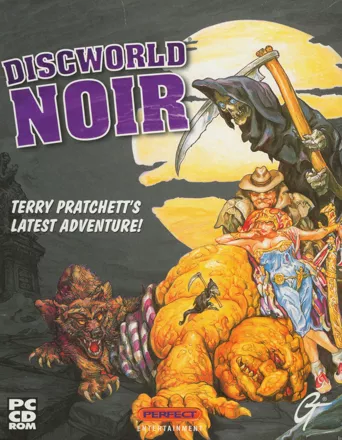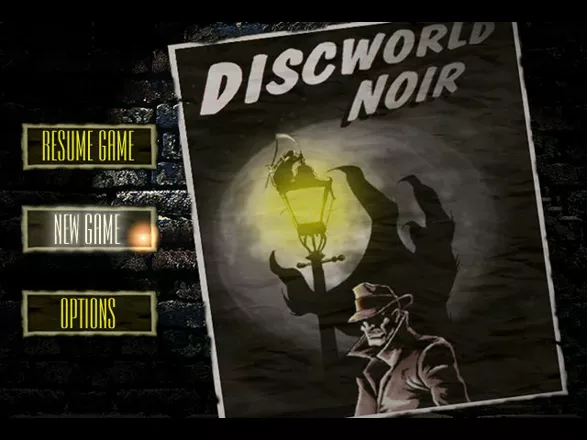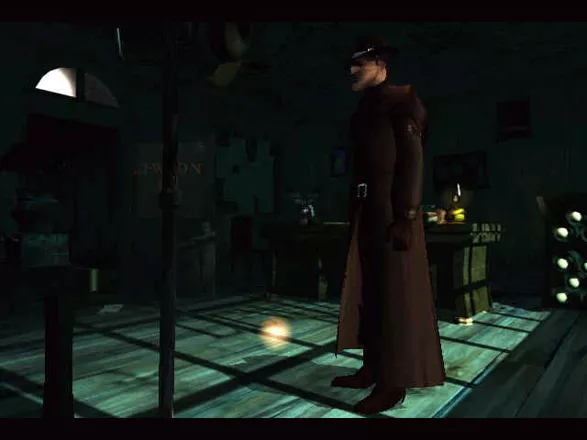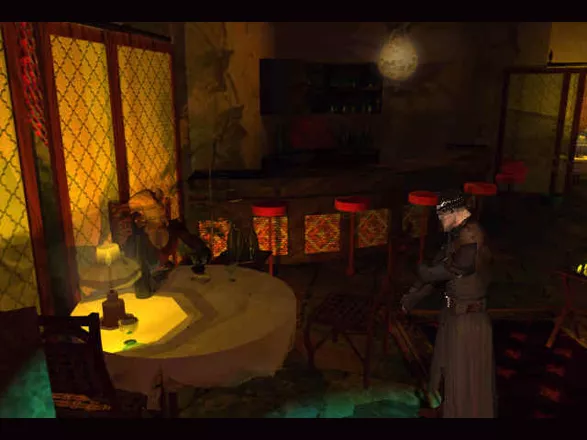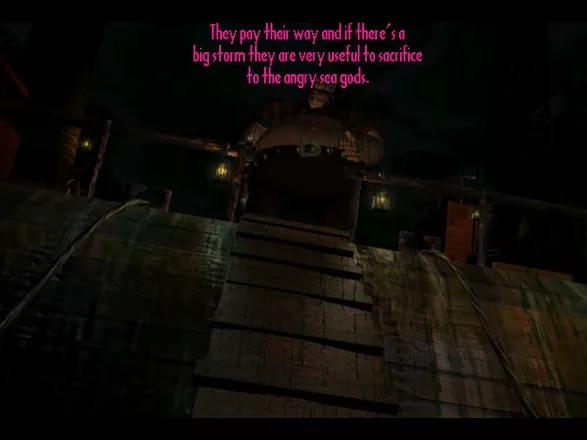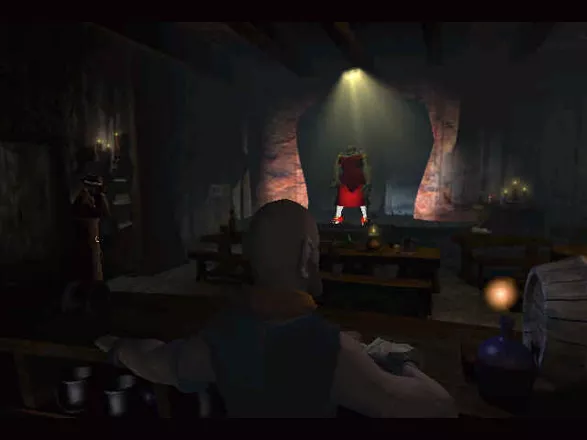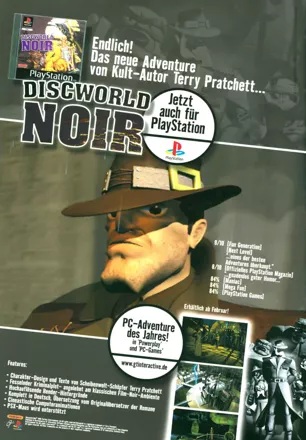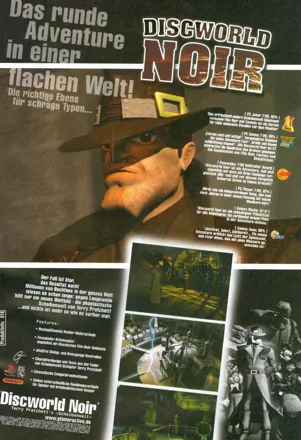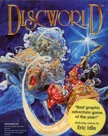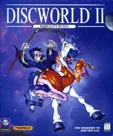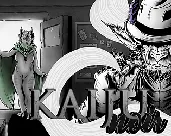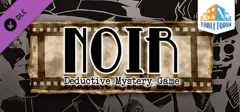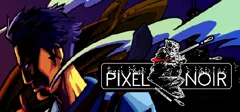Discworld Noir
Description official descriptions
Ankh-Morpork is a city surrounded by darkness, where the cold river Ankh flows, where it always rains, and where dwarves and trolls co-exist with secret societies, religious fanatics, stupid police captains, and bar pianists. It is also where a bitterly sarcastic sharp-eyed private investigator named Lewton tries to earn a living solving bizarre cases. A mysterious woman named Carlotta hires him to find her lost lover. Wandering through the dark city and gathering evidence, Lewton has to solve the case, confront a sinister conspiracy, and once again become torn between love and despair.
Discworld Noir differs from other Discworld adventure games not only thanks to its more serious tone and much darker "film noir" atmosphere, but also because of its gameplay. Instead of inventory-based puzzles there are clues, which Lewton writes down in his notebook and which should be then used whenever there is a connection between the clue and the situation in question. Most of the gameplay is thus dedicated to detective work in conversations; but the usage of the right clues at the right place is still comparable to inventory-based puzzle-solving of other adventures. Graphically, Discword Noir features three-dimensional character models and pre-rendered backgrounds.
Groups +
Screenshots
Promos
Credits (Windows version)
104 People (90 developers, 14 thanks) · View all
| Designed By | |
| Produced By | |
| Executive Producer | |
| Script By | |
| Voice Of Lewton | |
| Other Characters Voiced By | |
| Animation Director And Senior Animator | |
| Technical Art Director | |
| Background Design And Concept Art | |
| Art Director | |
| Character Design | |
| Character Models | |
| Background Artists | |
| [ full credits ] | |
Reviews
Critics
Average score: 81% (based on 40 ratings)
Players
Average score: 4.0 out of 5 (based on 91 ratings with 7 reviews)
Decent game with bad interface
The Good
1999 saw the release of two adventure games that blended Film Noir with other genres. Grim Fandango was a fantastic mix of Film Noir, art deco and Mexican Day of the Dead. Discworld Noir blends Noir with medieval fantasy, which is perhaps a little less original but still entertaining. There's just something funny about a private eye in a trench coat and fedora working a city of pirates and dwarves and trolls. The voice acting in Discworld Noir is thankfully excellent (there's a lot of voiceover) and the artwork and overall atmosphere is dead-on Film Noir. As far as actual gameplay, the game introduces an innovative dialogue system that lets you use the notes you've taken in your detective's notebook to question NPCs.
The Bad
I realize and appreciate the fact that everyone has a different sense of humor. That said, I have to confess that I didn't find much of the humor in Discworld Noir all that funny. It's not that it's tasteless or offensive or anything...it just falls flat. It falls short of being groaningly un-funny and settles into a place where you can comfortably ignore the fact that the jokes even exist.
The interface is clunky and really shows the game's roots as a PSX title. The traditional inventory-interaction of almost all adventure games is present, but calling up your inventory and interacting with objects is a bit of a pain. The most frustrating aspect of Discworld Noir is that it requires the worst kind of screen trolling (moving your mouse around the screen looking for objects with which you can interact) - the hotspots don't stand out or change color or glow in any way when you mouse over them. There is a (plain white text) popup label for each item, but they are extremely easy to miss.
The Bottom Line
Bottom line: it's no Grim Fandango, but the story is cohesive and compelling enough to keep you interested and some of the puzzles are pretty good.
Windows · by Kurt Sample (1071) · 2001
Very good, if derivative and cliched, adventure.
The Good
You know what? I don't even like adventure games that much. I know I've reviewed quite a few, but it's because I love the storylines and the characters. If I haven't cracked a puzzle after twenty minutes, my knuckles are white and I'm looking for a walkthrough. The second time through these games is always the best, when I vaguely remember all the solutions. If I hadn't had a walkthrough to this game I'd have bitten a chunk out of the table by now.
Discworld Noir is an homage to all those Raymond Chandler novels, all those labryinthine plots, all those "Lishen buhster! Ya lookin fa trouble?!" accents. This is both a curse and blessing, but more on that later. I do like that world though; I went into the game feeling good and I came out feeling good...ish.
Discworld Noir's biggest asset is it's script - that is, it's dialogue. There is a lot of talking in this game but it's often brilliant. Sharp, dry humour is the order of the day, with that kind of post-adolescent nuance that 'Monty Python' had that makes the Discworld books so attractive to a certain kind of teenager. Characters in the game are brilliantly realised, often appearing deceptively complex. Personal favourites include Death, whose humour is dry as a bone (ha ha!!! I'm so funny!), and Carlotta's butler, whose passive aggressive demeanour I find endlessly amusing. The voice acting is also good considering the credits imply that only four people are responsible for all the characters. Despite the sometimes irritating deliberate slowness of the delivery and the occasional hearing of the same voice for different people, this is quite a feat. Although I swear at some points in the game, Lewton's voice is replaced by another actor's.
The graphics are good, if dark. The character models are also quite impressive, though hardly original. In fact, the most original thing about Discworld Noir is the way the usual object-orientated method of puzzle solving is dropped in favour of a clues-based system. Every time your character hears something interesting in a conversation, he writes it down, and you can then ask anyone you want about it. Genuine satisfaction arises when you successfully figure something out by asking the right people about the right things. Also, half way through the game, something...happens to your character, providing another new puzzle-solving system, and one which I found very enjoyable and perhaps underused.
The Bad
I know I've already described this game as cliched and if you see this game as a parody then you may wonder how this can be so. The thing is, film noir is so unbelievably well known and ingrained into so much of what we see that even when something comes along that takes the piss, it seems unoriginal. Discworld Noir, like SO many films and television programmes, takes off 'Casablanca's' two most famous scenes. It also references Lauren Bacall telling Humphrey Bogart how to whistle in 'To Have And Have Not'. Your character, Lewton, is a complex character for a computer game, but he's existed for over half a century in film, books and television. An unshaven pathological drinker in a fedora and raincoat, one of the only guys in the town with a soul but has been left bitterly hurt by women...yadda..yadda...you KNOW the guy already. You KNOW that the woman who's leaning on his desk at the beginning is a femme fatale who is secretly no good. It appears that games don't have enough clout to create an original story style, but are instead happy to take off the styles of famous books and movies. Take "Mafia"; whilst a very fine game, the story is basically a cross between Godfather and Goodfellas, but about 1/100th as good or believable. Whilst film noir is recreated much better in Discworld Noir than the world of Italian gangsters is in Mafia, it's just been done before. I don't really consider the game a parody as it seems to take it's subject matter too seriously; it's more of an homage except it doesn't change anything. "Blade Runner" is an homage to film noir and look how original that world is (was, for it's time). This is more like a direct rip-off and the developers don't seem to care. Still, why should they? Lots of people will buy this game BECAUSE it resembles all that Raymond Chandler stuff.
Other, more actual game-related problems include...
Whilst the character models are nice and pretty, being pre-rendered, they move like puppets underwater. You can see their polished polygon arms moving in their specific routines and it is surprisingly effective to begin with due to the skill of the animators, but if you concentrate on it, it starts looking very unnatural at times. Lewton, however, is modelled in real-time and moves much more fluidly but this serves to highlight the difference between him and everyone else.
Further on the point of unoriginality, the music in this game is good but totally bland. It really got to me after a while. I love jazz, it constitutes over half of what I listen to, but Discworld Noir's soundtrack I didn't like. It's got all those soft, mysterious sounding saxophones and that subdued piano but it's got no tune and no soul. It's generic. Like a lot of the game.
The plot is always interesting but for some reason doesn't grab you. Maybe because it flies off the handle after a while and becomes convoluted, but maybe because you don't empathise with any of it. I never really understood Lewton's motives to keep investigating other than, as he says, "because too many people told me not to".
Finally, the notepad with all your clues on it becomes a real hassle when you have to turn 12 pages to find the one you want. This is primarily why I said I was glad to have a walkthrough because it can get seriously frustrating otherwise. And also, (and this one is a real crime), the game is unable to find your saved files from the second CD. So when you've got half-way through the game, from then on you'll have to eject the second CD, put in the first, load the game, load the saved file, eject the first CD, and put in the second. Unbelievable!
The Bottom Line
One of the best non-Lucasarts adventures there is. When I completed this the first time, I considered it second only to Grim Fandango. I'm always on a high after I finish something though and the flaws are more obvious this time round. The world of Discworld Noir is so familiar that it has to work damn hard to surprise you. It does a few times though, if you stick with it and overlook the twists that you were expecting since the moment the package arrived in your house.
Windows · by Shazbut (163) · 2004
Dwarves and trolls in a tedious film noir
The Good
Discword Noir takes a fantasy setting - with dwarves, trolls, and what not - and mixes it with a film noir. I like stylish experiments, and this is definitely one of them. What's more, the setting is surprisingly organic and no aspect of it feels out of place. The result is a convincing detective mystery, complete with a heart-broken, ironic, bitter PI, mysterious femme fatale, shady organizations, and all the other ingredients of the genre, thrown into a fantasy world where anything can happen. Magical creatures frequent piano bars, and your fedora-wearing, dark-suited detective visits a temple that is home to a cult of a really existing deity.
The gameplay system is somewhat interesting. Instead of the usual inventory-based puzzles, the main focus of here is clue-gathering and conversations. Interrogating suspects opens ways to new locations and brings new clues, so conversations become an integral aspect of the gameplay. The clues you gather are the main gameplay tool in Discword Noir. You'll need to "use" the clues written in your notebook on people and objects you notice in the game world. Basically, it works almost like thinking aloud. You are trying to solve a detective mystery, so you'll have to think logically about the clues you get.
At one point, you'll be able to control a wolf in the game. You will see everything the way a real wolf would - your vision is blurred, but you can obviously smell things much better, and will have to use that to your advantage and solve puzzles that were impossible in human form.
Discword Noir has good atmosphere. An exquisite, fine melancholy accompanies the player from the beginning to the end. There is a feeling of loneliness and despair, but also soft sadness. The humor of the game is sophisticated and subtle, sometimes almost grotesque, with a lot of bitterness and irony. The graphics are kept mostly in dark colors, and the music is appropriately jazz-like. There are some really weird tunes to be heard in the game, almost as sophisticated as its dialogues. The story is strong, and the detective mystery line is surprisingly satisfying, with a few well-placed turns and twists.
The Bad
Discword Noir is a British game, and its humor is colored by its national origins. I know many people who prefer the dry wit of Albion to the more naive merriment of the New World. Personally, I can't always follow British humor, and a lot of their jokes are lost on me. This happened quite a few times in Discword Noir, when a conversation was clearly intended to be humorous but I failed to see the point. Lack of simplicity in dialogues is another potentially undermining aspect - sometimes I wished those people were speaking more plainly. Almost all the characters in the game try to sound smart and often use peculiar words and phrases that don't always fit the situation at hand.
The atmosphere is not always perfectly conveyed. It may sound like a strange complaint, but I'd prefer American voice actors in a game that imitates a chiefly American art style. The protagonist's voice, for example, is too distinctive with its underlying brashness to fit a low-key PI. Similarly, the jazz music is too sophisticated and mellow at once, lacking rhythmical consistency and simple swing of the style's homeland - being a jazz musician myself, I determined its European origins right away.
A significantly bigger problem is the gameplay. The clue system works well in the beginning, but quickly becomes exhausting and thoroughly unexciting. You'll have accumulated so many clues over the course of the game that resorting to a desperate "use every clue with every object" style of playing turns into the optimal solution. While I've rarely seen an adventure game that doesn't become cumbersome as it progresses, I wish they would simplify the process in this one: feverishly hunting for hotspots and browsing through endless pages of recorded information can really get in the way of the suspenseful investigation - not to mention that it's much less fun than combining items.
Like most adventure games of that barren time period, Discworld Noir sorely lacks interactivity. There are hotspots on the screen and you can click on them - this pretty much sums up the level of skill and involvement needed to complete the game. Following the sad, degrading simplification that befell the genre during the multimedia era, Discworld Noir keeps the player at a distance, refusing to open up its world and communicate.
The Bottom Line
Plowing your way through the tiresome clue system is not very exciting, particularly in a game with such limited interactivity. Discword Noir is an interesting stylistic experiment, but it's also a simplistic and average adventure game.
Windows · by Unicorn Lynx (181780) · 2016
Discussion
| Subject | By | Date |
|---|---|---|
| 'no US release' ? | Rola (8483) | Mar 29, 2015 |
| Awesome stuff | Unicorn Lynx (181780) | Feb 23, 2009 |
Trivia
References
- In the middle of the game, you meet a red-haired archaeologist girl, who carries a lot of ammunition, wears shorts and is called Laredo Cronk...
- Some of the detective things in this game are taken from Murder, My Sweet (1944), a P.I. Noir movie with Dick Powell playing Philip Marlowe (later a remake with Robert Mitchum was made, the title was renamed to Farewell, My Lovely, though). Lewton says "If I'd always knew what I said, I'd be a genius." which is exact phrase from the fore-mentioned movie. Also, there is a detective Nulty in both game and the movie, with same attitude of main character towards him.
References: Casablanca
There are plenty of references to famous noir films in Discworld Noir. Many of them allude to the classic Casablanca. For example, the game's romantic ending mirrors the ending of the film to the point of directly quoting the dialogue. Just as the heroes of the movie agree that they will "always have Paris", Lewton assures Ilsa that they will "always have Pseudopolis Hotel".
The demon pianist Samael is named after Sam, the pianist from Casablanca. There is the following dialogue in the game:
Lewton: Play it again, Sam.
Samael: You know what? No one's ever going to believe you said that.
As fans of the movie would know, the line "Play it again, Sam" was never actually said in Casablanca, but has become erroneously associated with it.
Ilsa Varberg is named after Ilsa Lund, the heroine of Casablanca. Lund and Varberg are both cities in Sweden.
Release
The game was only released in Europe because the US branch of GT Interactive had financial problems and collapsed, dashing hopes of a US release.
Awards
- Power Play
- Issue 02/2000 – Best Adventure in 1999
Information also contributed by Macintrash, MAT and Unicorn Lynx
Analytics
Upgrade to MobyPro to view research rankings!
Related Sites +
-
A Discworld Noir Fan Site
Fan Site -
Discworld Noir - FAQs & Guides
Several walkthroughs and other files on GameFaqs.com -
Discworld Noir - Wikipedia
article in the open encyclopedia -
Hints for Discworld Noir
These hints give you nudges before the solution is revealed, so the game is not spoiled for you.
Identifiers +
Contribute
Are you familiar with this game? Help document and preserve this entry in video game history! If your contribution is approved, you will earn points and be credited as a contributor.
Contributors to this Entry
Game added by Zhentarim7.
PlayStation added by Macintrash.
Additional contributors: Unicorn Lynx, Jeanne, Patrick Bregger.
Game added May 4, 2000. Last modified March 31, 2024.
